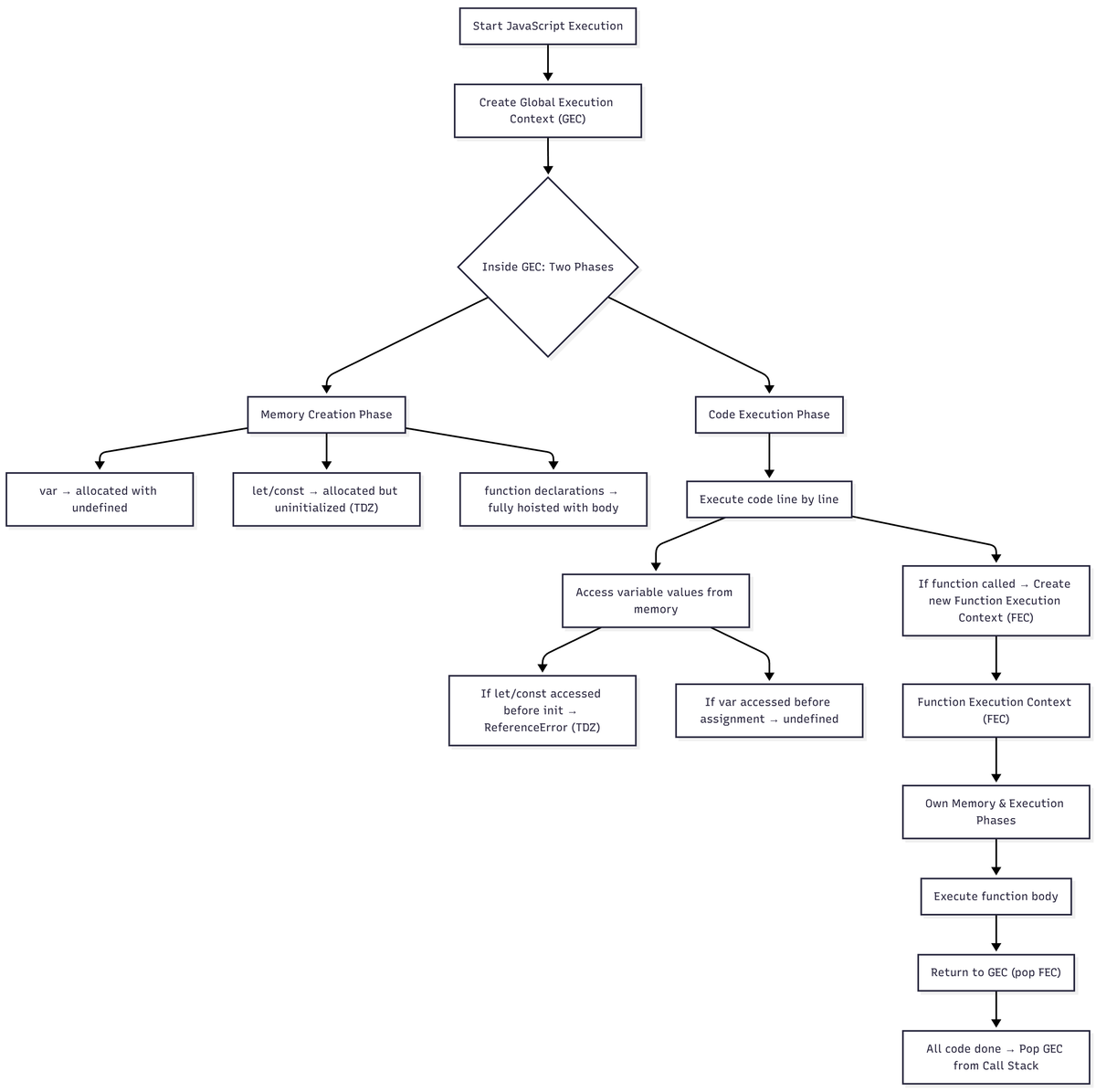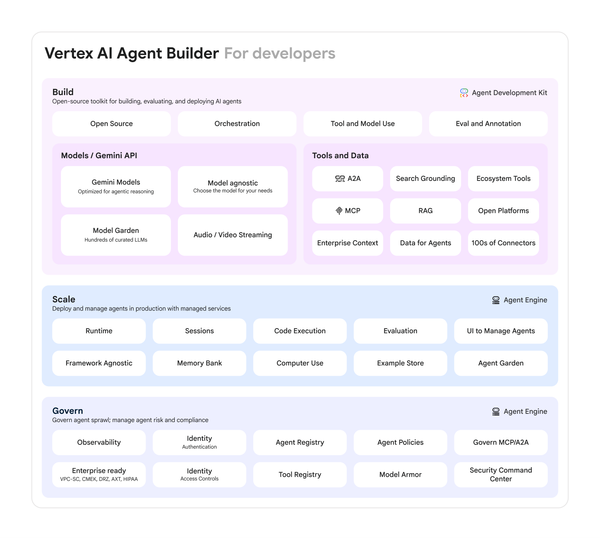How Global Execution Context and Temporal Dead Zone Work in JavaScript

# Understanding JavaScript Execution Context, Hoisting & Temporal Dead Zone (TDZ)
Have you ever wondered **how JavaScript runs your code behind the scenes**, how the **Global Execution Context (GEC)** works, and why variables behave differently with `var`, `let`, and `const`?
Let's break it all down step-by-step.
---
## Example Code
console.log('My age is', age)
console.log('My name is', name)
console.log('My country is', country)
var age = 24
let name = 'Shejan'
const country = 'Bangladesh'
sayHi()
function sayHi() {
console.log('Hi!')
}
---
## Expected Output Analysis
1. **Line 1**:
Prints: `My age is undefined`
Reason: `var` gets hoisted and initialized with `undefined`.
2. **Line 2**:
Throws: ReferenceError: Cannot access 'name' before initialization
Reason: `let` is hoisted but remains **uninitialized** within the **Temporal Dead Zone (TDZ)** until its declaration.
3. **Line 3**:
Will not execute because execution stops at the ReferenceError in line 2.
If line 2 were removed, line 3 would throw the same error for `const`.
4. **Function `sayHi()`**:
Fully hoisted with its body, so calling it before its definition works — **if** execution reaches that point.
---
## Topics to Cover
- [Global Execution Context](#global-execution-context)
- [Memory Creation Phase](#memory-creation-phase)
- [Code Execution Phase](#code-execution-phase)
- [Hoisting Behavior](#hoisting-behavior)
- [`var` vs `let` vs `const`](#var-vs-let-vs-const)
- [Temporal Dead Zone (TDZ)](#temporal-dead-zone-tdz)
- [Function Hoisting](#function-hoisting)
- [Key Takeaways](#key-takeaways)
---
## Global Execution Context
When JavaScript runs your code:
1. **Memory Creation Phase** – Allocates variables and functions in memory before any code executes.
2. **Code Execution Phase** – Executes your code line-by-line using the pre-allocated memory.
---
## Memory Creation Phase
During this phase:
- **`var`** → Hoisted, initialized to `undefined`.
- **`let`**, **`const`** → Hoisted, **uninitialized**, placed in TDZ until declaration.
- **Function declarations** → Fully hoisted with their body.
Example memory allocation for our code:
age: undefined
name:
country:
sayHi: function() { console.log("Hi!"); }
---
## Code Execution Phase
1. **`console.log("My age is", age);`** → Finds `age` in memory (`undefined`).
2. **`console.log("My name is", name);`** → Finds `name` in TDZ → throws ReferenceError.
3. Code stops here; `country` and `sayHi()` never run.
If `name` and `country` log statements were removed:
- Variables get assigned (`age = 24`, `name = "Shejan"`, `country = "Bangladesh"`).
- `sayHi()` runs because the function was already loaded into memory.
---
## Hoisting Behavior
**Hoisting** = Moving declarations to memory before execution starts.
Different types behave differently.
| Declaration Type | Hoisted | Initialized | Accessible Before Declaration? |
|----------------------|---------|-------------|---------------------------------|
| `var` | ✅ | `undefined` | Yes (returns `undefined`) |
| `let` | ✅ | No (TDZ) | ❌ ReferenceError |
| `const` | ✅ | No (TDZ) | ❌ ReferenceError |
| Function Declaration | ✅ | With body | ✅ |
---
## `var` vs `let` vs `const`
### `var`console.log(name) // undefined
var name = 'Rahim'
console.log(name) // "Rahim"
### `let`console.log(name) // ReferenceError
let name = 'Rahim'
console.log(name) // "Rahim"
### `const`console.log(age) // ReferenceError
const age = 24
console.log(age) // 24
---
## Temporal Dead Zone (TDZ)
The **TDZ** is the period between entering scope and the variable's declaration line.
Example:console.log(x) // ReferenceError
let x = 10
console.log(x) // 10
Purpose: Prevents access before declaration → safer code.
---
## Function Hoisting
### Function Declarationsgreet() // "Hello World!"
function greet() {
console.log('Hello World!')
}
✅ Works because both name and body are hoisted.
### Function Expressionsgreet() // TypeError: greet is not a function
var greet = function() { console.log('Hello World!') }
❌ Only variable name hoisted → initialized to `undefined`.
### Arrow Functions
Behave like function expressions regarding hoisting:sayHello() // ReferenceError
const sayHello = () => { console.log('Hello!') }
---
## Key Takeaways
- **All declarations are hoisted**, but initialization differs.
- **Function declarations**: call anytime before definition.
- **Function expressions/arrow functions**: follow variable rules.
- **TDZ**: Enforces safer code — access after declaration only.
- Understanding the two phases (memory creation, code execution) is essential for debugging and predictable coding.
---
## Visual Recap
1. **Memory Phase** — JavaScript inventories *what* exists.
2. **Execution Phase** — JavaScript runs in order, using prepared memory.
3. Errors occur (`ReferenceError`, `TypeError`) when accessing variables/functions before they’re properly initialized.
---
## Bonus for Content Creators
If you create **technical guides like this** and want to share them widely, tools like **[AiToEarn官网](https://aitoearn.ai/)** can help:
- AI-assisted content drafting
- Publish once to multiple platforms (Douyin, Kwai, WeChat, Bilibili, Rednote, Facebook, Instagram, LinkedIn, Threads, YouTube, Pinterest, X)
- Integrated analytics
- AI model ranking ([AI模型排名](https://rank.aitoearn.ai))
- Open-source: [AiToEarn GitHub](https://github.com/yikart/AiToEarn)
This lets you focus on **creating** while the system handles distribution and optimization — like the way JS prepares code in memory before execution.
---
**Happy coding!**
Master hoisting, TDZ, and execution contexts, and your JavaScript will be as predictable as you are.



